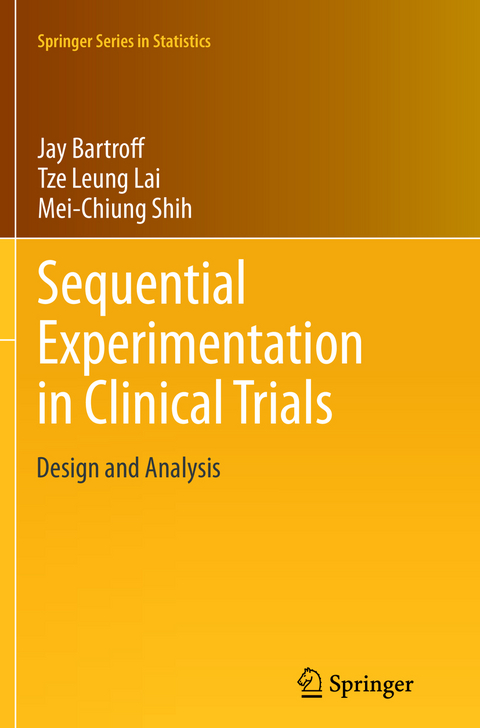
Sequential Experimentation in Clinical Trials
Springer-Verlag New York Inc.
978-1-4899-9598-8 (ISBN)
Sequential Experimentation in Clinical Trials: Design and Analysis is developed from decades of work in research groups, statistical pedagogy, and workshop participation. Different parts of the book can be used for short courses on clinical trials, translational medical research, and sequential experimentation. The authors have successfully used the book to teach innovative clinical trial designs and statistical methods for Statistics Ph.D. students at Stanford University. There are additional online supplements for the book that include chapter-specific exercises and information.
Sequential Experimentation in Clinical Trials: Design and Analysis covers the much broader subject of sequential experimentation that includes group sequential and adaptive designs of Phase II and III clinical trials, which have attracted much attention in the past three decades. In particular, the broad scope of design and analysis problems in sequential experimentation clearly requires a wide range of statistical methods and models from nonlinear regression analysis, experimental design, dynamic programming, survival analysis, resampling, and likelihood and Bayesian inference. The background material in these building blocks is summarized in Chapter 2 and Chapter 3 and certain sections in Chapter 6 and Chapter 7. Besides group sequential tests and adaptive designs, the book also introduces sequential change-point detection methods in Chapter 5 in connection with pharmacovigilance and public health surveillance. Together with dynamic programming and approximate dynamic programming in Chapter 3, the book therefore covers all basic topics for a graduate course in sequential analysis designs.
Jay Bartroff is Associate Professor of Mathematics at the University of Southern California where he is a member of the Laboratory of Applied Pharmacokinetics at the USC Keck School of Medicine. He is a leading expert on group sequential and multistage adaptive statistical procedures and their applications to clinical trial designs, and he is a sought-after consultant in academia and industry. Tze Leung Lai is Professor of Statistics, and by courtesy, of Health Research and Policy and of the Institute of Computational and Mathematical Engineering at Stanford University, where he is the Director of the Financial and Risk Modeling Institute and Co-director of the Biostatistics Core at the Stanford Cancer Institute and of the Center for Innovative Study Design at the School of Medicine. He made seminal contributions to sequential analysis, innovative clinical trial designs, adaptive methods, survival analysis, nonlinear and generalized mixed models, hybrid resampling methods, and received the Committee of Presidents of Statistical Societies (COPSS) Award in 1983. Mei-Chiung Shih is Assistant Professor of Biostatistics and a member of the Stanford Cancer Institute and of the Center for Innovative Study Design at the School of Medicine at Stanford University. She is also Associate Director for Scientific and Technical Operations at the Department of Veterans Affairs (VA) Cooperative Studies Program Coordinating Center at Palo Alto Health Care System. She is a leading expert on group sequential and adaptive designs and inference of clinical trials, longitudinal and survival data analysis, and has been leading the design, conduct and analysis of several large trials at the VA.
Introduction.- Nonlinear Regression, Experimental Design, and Phase I Clinical Trials.- Sequential Testing Theory and Stochastic Optimization over Time.- Group Sequential Design of Phase II and III Trials.- Sequential Methods for Vaccine Safety Evaluation and Surveillance in Public Health.- Time-Sequential Design of Clinical Trials with Failure-Time Endpoints.- Confidence Intervals and p-Values.- Adaptive Design of Confirmatory Trials.- References.
| Erscheint lt. Verlag | 28.1.2015 |
|---|---|
| Reihe/Serie | Springer Series in Statistics ; 298 |
| Zusatzinfo | XVI, 240 p. |
| Verlagsort | New York |
| Sprache | englisch |
| Maße | 155 x 235 mm |
| Themenwelt | Mathematik / Informatik ► Mathematik ► Wahrscheinlichkeit / Kombinatorik |
| Studium ► Querschnittsbereiche ► Epidemiologie / Med. Biometrie | |
| ISBN-10 | 1-4899-9598-6 / 1489995986 |
| ISBN-13 | 978-1-4899-9598-8 / 9781489995988 |
| Zustand | Neuware |
| Informationen gemäß Produktsicherheitsverordnung (GPSR) | |
| Haben Sie eine Frage zum Produkt? |
aus dem Bereich


